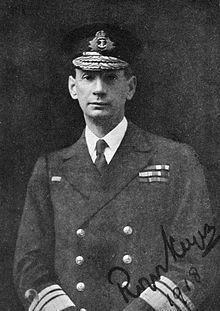18 August 1915
Commodore Sir Roger Keyes, Royal Navy - Keyes had not lost hope that another naval attack could force the Dardanelles and possibly change the balance of power in the allies’ favour. The Army had failed so far, despite its brave efforts, but would a renewed naval attack release the Army from the deadlock they were in?
 The failure on 18th March had not been forgotten when the Royal Navy had been defeated by Turkish minefields and shore batteries, but Keyes hoped that another attack would surprise the Turks. He also hoped that most of the smaller howitzer batteries had been moved to support the Turkish land forces, and now, with improved balloon and aeroplane spotting and a more efficient sweeping flotilla, a breakthrough could have been possible.
The failure on 18th March had not been forgotten when the Royal Navy had been defeated by Turkish minefields and shore batteries, but Keyes hoped that another attack would surprise the Turks. He also hoped that most of the smaller howitzer batteries had been moved to support the Turkish land forces, and now, with improved balloon and aeroplane spotting and a more efficient sweeping flotilla, a breakthrough could have been possible.
At this stage, as mad as the scheme sounded, it was probably the best option open to the Mediterranean Expedition Force. If a British Squadron, supported by submarines, could breakthrough into the Sea of Marmara; would this be enough to release the pressure on the army? Of course, it was a big hope; would the now strengthened minefields, shore-based torpedo tubes and restocked Fort arsenals be any less a challenge than they were at the last attempt. And where were the German submarines and Turkish torpedo boats and battleships? Would they be in the area, picking off each and every approaching British vessel that squeezed its way through the narrows? All is circumspect; a bold move this would have been, and it may have surprised the Turks, but it was doubtful that it would have succeeded.
Keyes tried to persuade Admiral John De Robeck of the idea to no avail, but this did not stop Keyes enthusiasm for the scheme. He wrote to Admiral Wemyss for support, and got this reply.
"My Dear Roger,
Many thanks. I should find it very difficult not to agree with your memo of 17th. Whilst there was any chance of the Army winning through, the argument was different, but late events have quite altered the balance of the scales. A naval attack on our objective is the only way now to avert a winter campaign, whose greatest achievement can only be stalemate at the cost of much wastage. The presence of but a small number of ships on the other side of the Narrows, would so alter the situation in our favour that it would surely be worth the loss of an equal number of ships. Of course there may be political and perhaps even strategical issues at stake of which we out here know nothing - but authorities at home would judge of these.
A British Squadron, however small, in the Marmora could not, I think, but have an enormous effect upon the whole war. It is difficult for us out here to weigh the good effects against the possible losses.
Personally I am of opinion that the result would be in favour of a shove.
Yours, R. E. Wemyss"
But we would never know. The war was changing in its focus, and time was running out for Hamilton as Kitchener, and the War Office, were already focussing back on the Western Front. The next move would not be that of the navy though; Hamilton was already planning another big attack at Suvla and, for this, he needed the support of the Navy, and not for it to go off and take risks in the Dardanelles.
"SOURCE:
The Naval Memoirs of Admiral of the Fleet, Sir Roger Keyes, 1910-1915 (Thornton Butterworth Ltd; London 1934), pp.413-417.
